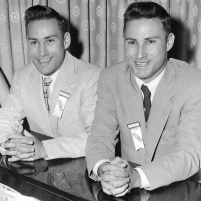History’s First Organ Donor Dies at 79
Wednesday, January 05, 2011
 Richard and Ronald Herrick in 1955 (photo: Associated Press)
Richard and Ronald Herrick in 1955 (photo: Associated Press)
Ronald Herrick, 79, who became the first successful organ donor in medical history when he gave a kidney to his twin brother, Richard, died on December 27, 2010, while recovering from heart surgery.
The December 23, 1954, transplant surgery was performed at Peter Bent Brigham Hospital in Boston by Dr. Joseph Murray, who went on to win the Nobel Prize in medicine for his groundbreaking work. The organ donation extended the life of Richard Herrick by eight years.
The twins were 23 years old when Richard developed an apparently fatal case of chronic kidney inflammation. Previous attempts at organ transplants had all failed. Kidney specialists at the hospital, including Dr. Murray, thought that using identical twins might overcome the problem of the recipient’s immune system rejecting the new organ as a foreign object. They were right. The transplant held; Richard Herrick married his recovery room nurse and had two children; and he lived another eight years.
Ronald Herrick was reportedly an unassuming and modest man who rarely volunteered to mention his role in medical history. He spent his life working as a math instructor in high schools, junior highs and colleges.
Each year, about 20,000 organ transplants are performed in the United States alone.
-Noel Brinkerhoff, David Wallechinsky
World's First Organ Donor Dies at 79 (by Bryan Marquard, Boston Globe)
Kidney Saved Many (by Lee Hammel, Worcester Telegram & Gazette)
First Successful Organ Donor Dies (by Elizabeth Cooney, Boston Globe)
- Top Stories
- Unusual News
- Where is the Money Going?
- Controversies
- U.S. and the World
- Appointments and Resignations
- Latest News
- Trump to Stop Deportations If…
- Trump Denounces World Series
- What If China Invaded the United States?
- Donald Trump Has a Mental Health Problem and It Has a Name
- Trump Goes on Renaming Frenzy






Comments